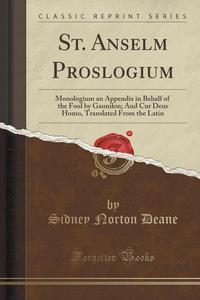Excerpt from St. Anselm Proslogium: Monologium an Appendix in Behalf of the Fool by Gaunilon; And Cur Deus Homo, Translated From the Latin
He died in 1109. He left a great number of writings, the most important of which are: the Dialogus de grammatico, the Monologium de divinitatis essential sive Exemplum de ratione fidei, the Proslogium sive Fides qu?rens intellectum, the De veriatate, the Defide trinitatis, and the Cur Deus Homo?
"The second Augustine, as St. Anselmus had been called, starts out from the same principles as the first; he holds that faith precedes all reflection and all discussion concerning religious thing. The unbelievers, he says, strive to understand because they do not believe; we, on the contrary, strive to understand because we believe. They and we have the same object in view; but inasmuch as they do not believe, they cannot arrive at their goal, which is to understand the dogma. The unbeliever will never understand. In religion faith plays the part played by experience in the understanding of the tings of this world. The blind man cannot see the light, and therefore does not understand it; the deaf-mute, who has never perceived sound, cannot have a clear idea of sound. Similarly, not to believe means not to perceive, and not to perceive means not to understand. Hence, we do not reflect in order that we may believe; on the contrary, we believe in order that we may arrive at knowledge. A Christian ought never to doubt the beliefs and teachings of the Holy Catholic Church. All he can do is to strives, as humbly as possible, to understand her teachings by believing them, to love them, and resolutely to observe them in his daily life. Should he succeed in understanding the Christian doctrine, let him render thanks to God, the source of all intelligence! In case he fails, that is no reason why he should obstinately attack the dogma, but a reason why he should bow his head in worship. Faith ought not merely to be the starting-point, - the Christian"s aim is not to depart from faith but to remain in it, - but also the fixed rule and goal of thought, the beginning, the middle, and the end of all philosophy.
"The above almost literal quotations might give one the impression that St. Anselmus belongs exclusively to the history of theology. Such is not the case, however. This fervent Catholic is more independent, more of an investigator and philosopher than he himself imagine. He is a typical scholastic doctor and a fine exponent of the alliance between reason and faith which forms the characteristics trait of medi?val philosophy.
About the Publisher
Forgotten Books publishes hundreds of thousands of rare and classic books. Find more at www.forgottenbooks.com
This book is a reproduction of an important historical work. Forgotten Books uses state-of-the-art technology to digitally reconstruct the work, preserving the original format whilst repairing imperfections present in the aged copy. In rare cases, an imperfection in the original, such as a blemish or missing page, may be replicated in our edition. We do, however, repair the vast majority of imperfections successfully; any imperfections that remain are intentionally left to preserve the state of such historical works. Это и многое другое вы найдете в книге St. Anselm Proslogium (Sidney Norton Deane)
